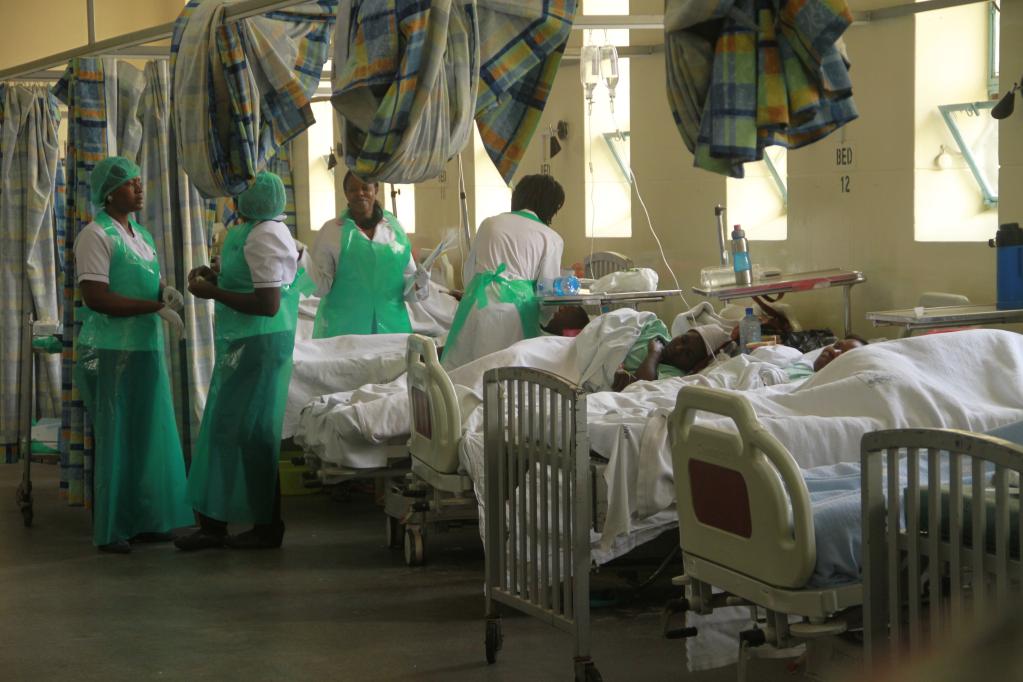
Cholera outbreak in Kenya
Key details as of April 6, 2025.
The government has activated multi-sectoral Rapid Response Teams to curb the outbreaks
In Summary
 The file photo shows medics attending to cholera patients at the Kenyatta National Hospital in Nairobi, capital of Kenya, July 19, 2017. (Xinhua)
The file photo shows medics attending to cholera patients at the Kenyatta National Hospital in Nairobi, capital of Kenya, July 19, 2017. (Xinhua)
In
the recent past, unprecedented outbreaks of preventable diseases have rocked the
country, leaving the affected Kenyans in shock.
This wave of disease outbreaks and infections swept across the nation affecting several individuals in different parts.
Faced with the high spread of the lingering fatal flu-like fever known as Kala-azar or black fever, monkeypox (or simply M-pox), and the increased cases of cholera, a waterborne disease that poses a serious public health risk the affected Kenyans have been thrown into panic, fear and uncertainty as the diseases claimed scores of lives.
In response to the people’s dilemma the government swiftly took charge and has largely managed to contain the spread.
“The government has activated multi-sectoral Rapid Response Teams to curb the outbreaks,” said the Government Spokesperson Dr. Isaac Mwaura in his latest media briefing session at the Kenyatta International Convention Centre (KICC) accompanied by his Deputy Mr. Gabriel Muthuma.
Surveillance, he added, had been intensified in all sub-counties and border areas, with isolation facilities fully equipped with treatment guidelines and staffed with qualified healthcare workers fully armed with medical supplies being provided.
The Government Spokesperson reassured the country of the government’s commitment to curb the spread of the lethal diseases under SHA’s component of primary health care and ensure that such infections are effectively prevented in the future.
He noted that adequate critical resources, including medicines, lab kits for testing and protective gears, had been distributed to the frontline responders with enhanced public sensitization campaigns being carried out in full swing while leveraging local radio stations, public barazas and door-to-door outreach to promote hygiene and selfcare.
“Cholera being a water borne disease is being countered with treatment chemicals, soap and hand washing stations provided at the village levels in the affected areas to avoid further spread.” Added Dr. Mwaura.
The outbreak of cholera is reported in Migori, Kisumu and Nairobi counties where six lives have so far, been lost and 100 more cases reported in the three regions, prompting increased surveillance and public health interventions.
Kalazar is rampant in the northern parts of the country mainly affecting Turkana, West Pokot, Baringo, Isiolo, Wajir, Marsabit and Garissa Counties where a total of 33 lives have been lost leaving 600 others affected in a span of seven months following the outbreak in September 2024.
The life-threatening disease, also called Visceral leishmaniosis, is caused by a parasite transmitted through the bite from the infected sandflies.
Dr. Mwaura urged the communities to seek early testing and treatment to prevent further loss of lives noting that the Ministry of Health continues to bolster resources and coordination to contain the three-pronged disease spread.
He gave a case of the 12-year-old Mercy Atieno who narrowly escaped death following a sudden onset of watery diarrhea that signaled cholera’s grip in Nairobi’s Kibera informal settlement area.
“Mercy was immediately treated, leading to full recovery, a testament to the success of the government’s ongoing efforts to combat the disease with early presentation for diagnosis,” observed the Government Spokesperson.
The World Health Organization (WHO) describes cholera as an acute diarrheal infection caused by consuming food or water contaminated with the bacterium Vibrio cholera.
Cholera can cause severe acute watery diarrhea, which, if left untreated, leads to death within hours.
While most individuals infected do not develop symptoms, they can still spread the bacteria through their feces for a period ranging from 1 to 10 days, posing a significant public health risk, warns part of the content on the WHO’s website.
According to the Ministry of Health, the symptoms experienced by the affected members of the public have been notably intense, ranging from severe headaches, joint aches, high fevers, sore throats, persistent sneezing, coughing, and fatigue that, in many cases, lasts well over a week.
The Ministry of Health, in collaboration with various county governments, has implemented a series of coordinated interventions aimed at curbing the spread of the disease.
One of the key measures includes enhanced surveillance efforts, which involve active case finding, contact tracing and the deployment of rapid response teams at both the national and county levels.
Healthcare workers are being sensitized on key areas such as disease surveillance, case management, water sanitation, hygiene promotion, and risk communication to ensure effective response and treatment.
“Risk communication and community engagement are being prioritized through the dissemination of information using community health promoters, administrative officers, and media platforms, as well as through the distribution of Information, Education, and Communication (IEC) materials and videos,” reads a statement from the Ministry of Health.
The ministry, the statement adds, has issued a set of public health guidelines to help prevent the spread of cholera and safeguard communities from infection.
However, personal hygiene remains a key pillar in the cholera prevention, and individuals are advised to wash their hands with soap and clean water after using toilet, before eating or preparing food and after caring for the sick.
The Ministry of Health reassures the public that the country is adequately prepared to manage and contain the outbreaks.
Lucy Waithira works at the Office of Government Spokesperson as a PSIP Intern

Key details as of April 6, 2025.